Software Freedom in Europe 2023
vendredi 20 octobre 2023 à 01:00Software Freedom in Europe 2023
In 2023, Software Freedom has been back on stage, while we have boosted our activities for the coming generations with our children's book and the coding competition for young Europeans. We have also continued to bring our demands to lawmakers, helped projects to become REUSE compliant and we have shared many great moments with our community.
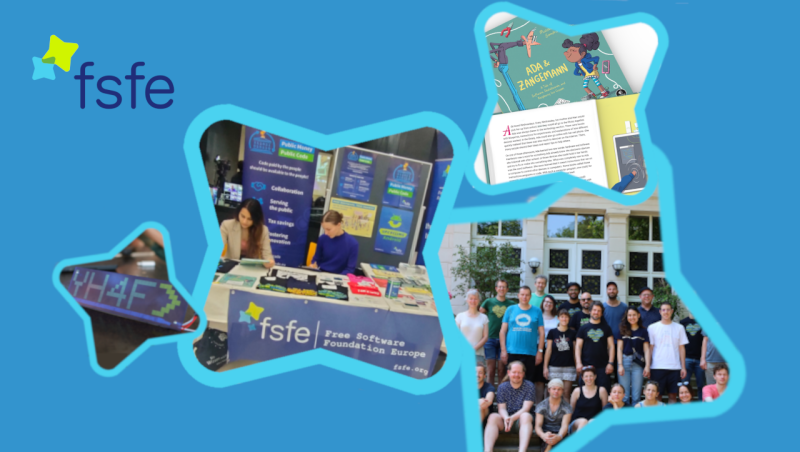
40 Years of Software Freedom! The 40th anniversary of the launch of the GNU Project, which marked the beginning of the software freedom movement, has led us to look back at all that we have achieved over the past four decades, but also at the challenges that lie ahead in the years to come.
Since the 1980s, technology has become an increasingly important part of our lives: we use devices at home to make our daily tasks easier, most of us use a laptop at work, we use technology in our leisure time (playing, travelling...). And this year, Artificial Intelligence has jumped in in a lot of our debates, as it has become a hot topic in the public sphere.
Our movement has become global and broad encompassing small local companies, large global corporations, civil society organisations and thousands of professionals. We are all working towards a world where the four freedoms are guaranteed: users are free to use software , to adapt it to their needs, and are able to understand it, and to share it. These rights support other fundamental rights such as freedom of speech, freedom of the press, and privacy.
However, just like 40 years ago, we still need trustworthy systems that put the end user in control. Recent technological developments show that this is more important than ever: in the era of the Artificial Intelligence we need remember to put people's rights first. In a world that communicates through social media, we need decentralised and federated networks that are not controlled by an autocratic individual. In a time in which we are surrounded by devices, we need not only to be able to use them, but also to understand them and to improve them, adapting them to our necessities and needs.
In this scenario, we need to empower new generations. They are the first generation, many of whom have had 24/7 access to the internet, connected devices and social media networks since birth. As a result, their comfort level with technology is quite high. However, in order to build a democratic, transparent and trustworthy society that relies more and more on our technological developments, our children also need to understand, tinker and experiment with technology.
The history of humanity has been written through creativity, diversity and collaboration. Tinkering, first with our hands and now additionally with computer technology, has helped us to evolve, to learn from our mistakes and from the experience and knowledge of others. Let's give our current and future generations the right to do the same. Let's give them the power to shape our technology and make it their own. Why show them that there is only vanilla when we have endless flavours?
Our Software Freedom in Europe 2023 report covers the FSFE's activities from November 2022 to August 2023. We hope it gives you a better understanding of our daily work and that you enjoy reading it!
Table of contents
- Ada & Zangemann: a story that travels the world
- Youth Hacking 4 Freedom: A coding competition
- Public Money, Public Code!: simple, right?
- Liability, Interoperability and Free Software in the EU
- Legal Support: helping projects and individuals
- REUSE: making licensing easier
- Legal Education Day 2022
- Legal support, research, innovation and standardization: participation in EU projects
- Legal Network and LLW 23
- TEDective: making European public procurement data explorable
- Device Neutrality: taking control of devices
- Our work on public awareness
- I Love Free Software Day: Meet & Connect
- Software Freedom Podcast: giving a voice to our community
- Free Software and Federated social networks
- ‘What is Free Software’ Video
- Back to the stages, the booths, and “the hugs”!
- Join the movement
Ada & Zangemann: a story that travels the world
“I loved the book; I found the theme very important and interesting, and the message delighted me (first the resourcefulness of Ada, then the demonstration which unites the whole city, and finally the Parliament which learns from its mistakes). This book is exactly what I want to pass on to my children!”
Canelle A., 18-year-old student translator in a Parisian high schoolThe illustrated book 'Ada & Zangemann - A Tale of Software, Skateboards, and Raspberry Ice Cream' by the FSFE, tells the story of the famous inventor Zangemann and the girl Ada, a curious tinkerer. Ada begins to experiment with hardware and software, and in the process realises how crucial it is for her and others to control technology.
The book is currently available in German and now also in English. However, thanks to many volunteers, Ada & Zangemann is also being translated into other languages such as French, Italian, Danish or Valencian. These community translations and and other resources can be found in the book's git repository.
"The youth at the Elizabeth Peabody House enjoyed the reading of Ada & Zangemann. It was a fun and engaging read; vivid illustrations, colors, and details on each page kept them excited for what came next. The youth could relate to Ada, as they are full of great, creative ideas; that they hope to bring to life too"
Matthew Caughey, Executive Director, The Elizabeth Peabody HouseOver the past few months, the story of Ada & Zangemann has also been spread through readings. More than 900 people have already attended in one of these events in Germany, Italy, Belgium, and the USA. Started by the author, Matthias Kirschner, the readings are currently being carried out by other FSFE staff and volunteers! For example, Bonnie Mehring read it at CCCamp, Dario Presutti read it in Italy to celebrate the Software Freedom Day and the volunteer Isabel Dross-Fromm read it, with the help of her child, at FrOSCon.
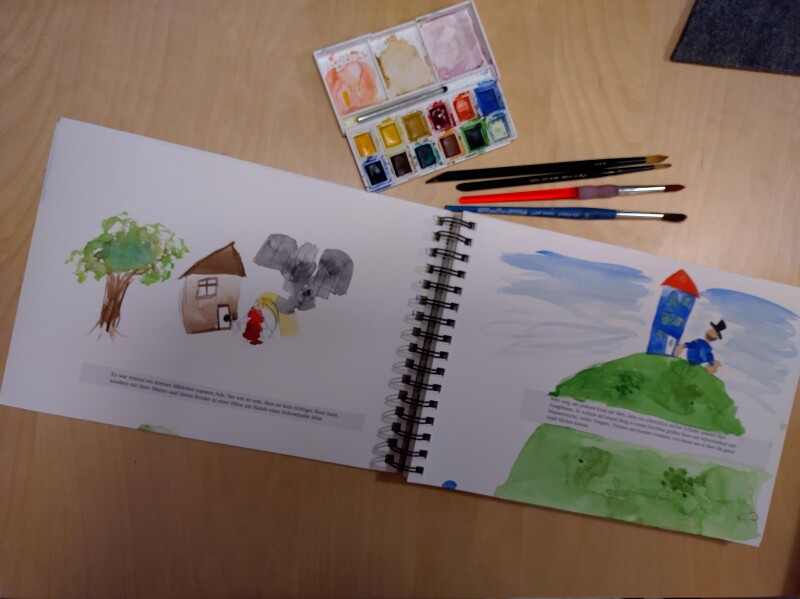
Ada also went overseas to LibrePlanet, the FSF's annual conference, and we found out that she made it to rural Rajasthan, and to a hospital school in the Middle East, where impaired children from that region realised a small detail that most readers may have missed: Ada & Zangemann is also about inclusivity. In the book there is a girl with a 3D printed leg. Did you notice it?
"I read this book to my 6-year old child who was drawn by the beautiful illustrations and couldn’t wait to hear the story. It’s been the start of a much-needed conversation on out-of-the-box thinking, digital freedom, and contesting power in the age of surveillance."
Claire Fernandez, Executive Director, European Digital Rights (EDRi)Moreover Matthias Kirschner was invited to participate in different podcasts, to talk about the book and Free Software:
- iheartSTEAM - Free Software for All? Let a Children’s Book Explain the Concept!
- Linux Inlaws - Ada & Zangemann: a children’s book about FLOSS (book reading)
- LinuxUnplugged - Episode 510: Thinking in Decades’
- The Fight to RepaiR – Episode 17
Youth Hacking 4 Freedom: A coding competition
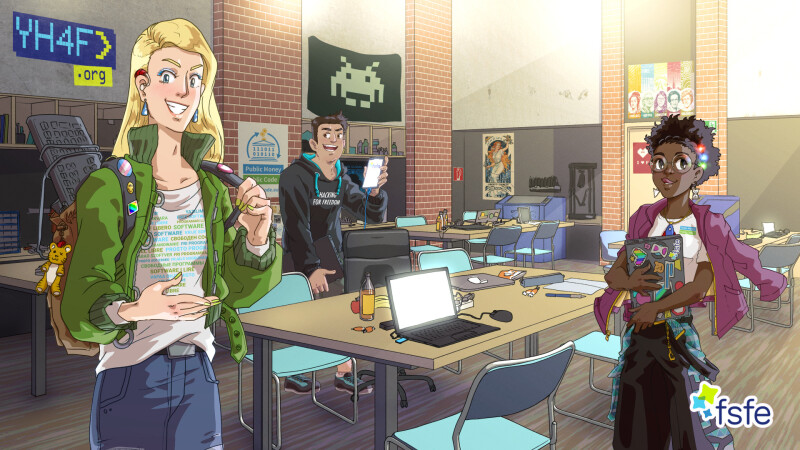
Two years ago the FSFE launched the first round of the Youth Hacking 4 Freedom (YH4F) coding contest. YH4F is an initiative aiming to raise awareness for Free Software among the younger generation. The competition encourages teenagers to tinker and experiment with technology. It gives participants the opportunity to discuss and network with important people in the field of computer science and Free Software. The winners are rewarded with a trip to Brussels and a cash prize, which could be an investment for their own project. Have a look at Bonnie Mehring’s talk about the YH4F competition at the Augsburger Linux-Infotag 2023 (in German).
After the successful conclusion of the first round in 2022, the FSFE organised the second round, which launched at the beginning of this year.
First edition: The winners of the first edition had the chance to spend a joyful time in Brussels, where the awards ceremony took place. The weekend was summarised in a short video and this year we have published interviews with the participants to learn more about their backgrounds and the projects they developed.
Watch the video of the two day trip to Brussels where the winners met, explored the city, and received their awards. For subtitles, watch it in our Peertube instanceSecond edition: the winners of the 2023 edition were announced at the Awards Ceremony, held in Brussels in mid-October. Over the coming months, we will be publishing interviews with the participants about their projects. So stay tuned!
‘Public Money? Public Code!: simple, right?
Software made with public money should be released as Free Software. Simple and clear, right? Over the past few months, we have continued our activities to raise awareness of this initiative and to explain why it is important.
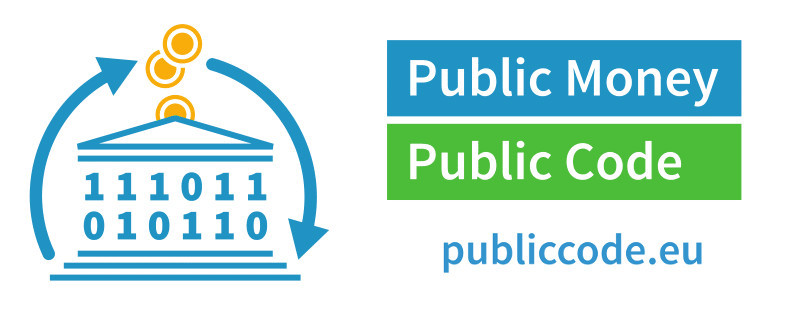
Free Software in German municipalities: In January, we hosted an online event on Free Software in Dortmund, Germany, with the participation of the local government and more than 160 other community representatives. Under the title "Municipalities need Free Software" the participants were informed about the developments leading to a newly founded OSPO in Dortmund, about "Public Money? Public Code!", Free Software as the key to digital sovereignty, and new perspectives for municipalities that want to use Free Software. The event, that was recorded, was organised in cooperation with Do-FOSS and OK.NRW.
As a result of the event, the FSFE invited all participants and others from municipal administrations to join our new mailing list on Free Software in German municipalities, which currently has more than 200 subscribers.
A German “Sovereign Workplace” for public administrations: The current German government is working on a sovereign workplace, a Free Software office and collaboration suite for the public sector, as one of the projects to fulfil the goals of the coalition agreement. However, a closer look at the project raises questions such as: Where is the source code? Who is responsible for it? What happens to the public money involved? We asked the German Federal Ministry of the Interior and Community (BMI) and publicly analysed the answers, criticising the German state-owned enterprise Dataport for open-washing its pseudo-sovereign product dPhoenixSuite.
If you are interested in this topic, check out Johannes Näder's talk about it at FrOSCon: “Free Software for German administrations? Mysteries around the Souvereign Workplace” (in German).
Midterm evaluation of the German government: In addition, the FSFE, together with an alliance of civil society, scientific institutions and the Free Software industry, published a call to the German government to implement a sustainable digital policy and to provide the necessary funds in the federal budget. We draw a negative mid-term balance for the digital policy of the German government and demand a change towards Free Software and Public Money? Public Code!
PMPC in Italy: Six Public Money, Public Code! events were held in Italy, in six different cities: from the extreme north to the extreme south: Trento, Bologna, Caltanissetta, Milan, Bolzano, and Empoli. The events were run entirely by volunteers.
Public Awareness: In this context, we got an article on Free Software to control technology published (pages 11-12[18-21]) (pdf) in “Access OpenTech" for the CrossCulture Programme (CCP) by ifa. You can also listen (in German) to Johannes Näder explaining in the eGovernment-Podcast our initiative Public Money? Public Code! initiative and why Free Software is important for administrations and their digital sovereignty. One episode of our Software Freedom Podcast also covers this topic with Petter Joelson, the director of Digidem Lab, discussing citizen participation and the Decidm tool.
Do not forget to support the Public Money, Public Code! initiative by signing the Open Letter, sharing your picture on your social networks and talking about to your local authorities.
Liability, Interoperability and Free Software in the EU
Political decisions and policies have a major impact on Free Software, its ecosystems and its communities. The FSFE has long-standing experience of working with policy makers and public bodies in Europe, from local administrations to high level decision makers. The FSFE aims to strength the rights of Free Software users and developers, and works to abolish barriers to the adoption of Free Software.
In the coming months, we expect the following legislation to be adopted in the EU: Liability Act, AI Act, CRA and Interoperability Act.
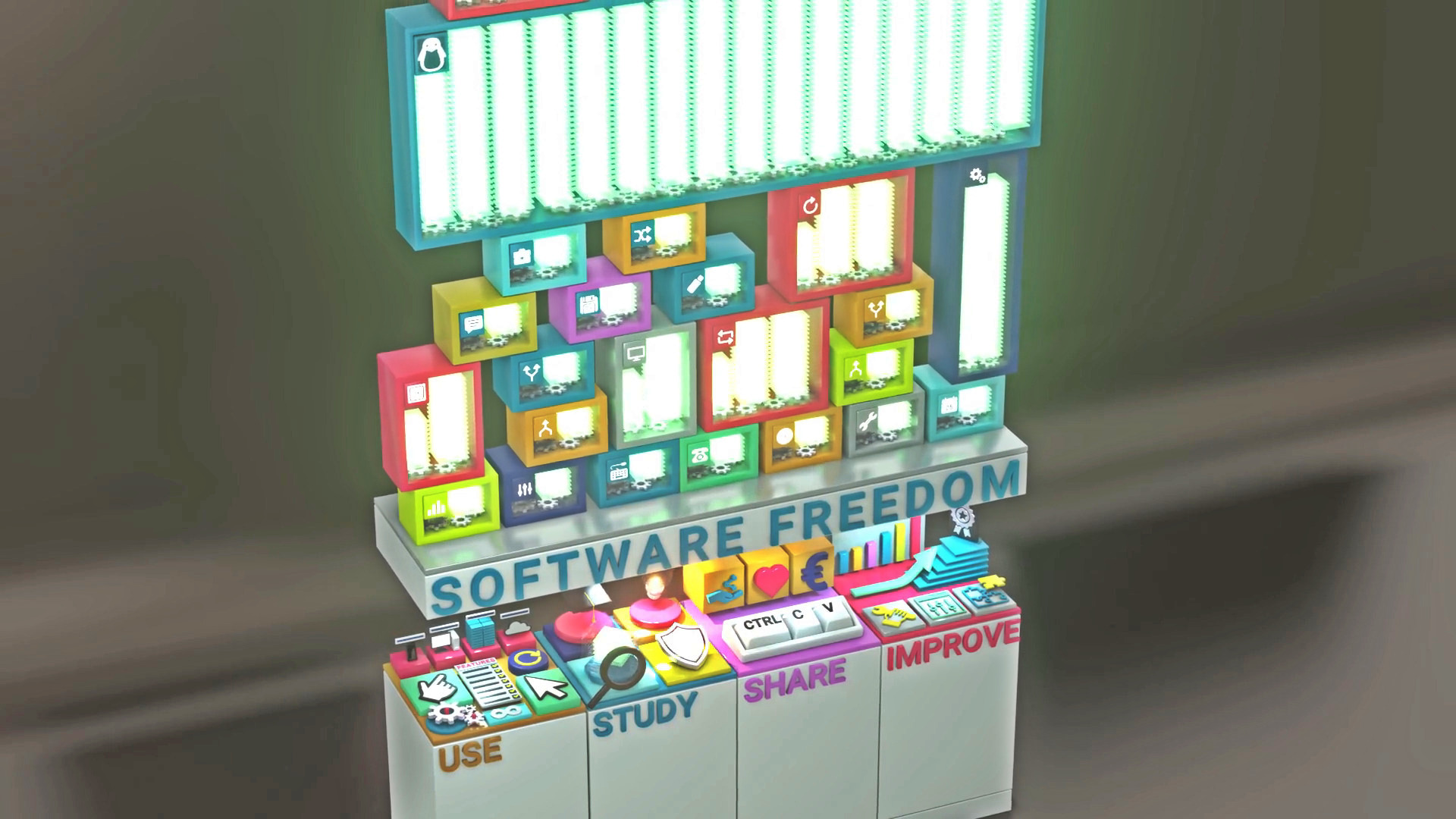
Liability / AI Act: The EU is debating the introduction of liability rules for software, including Free Software. The relevant proposals are the AI Act, the Product Liability Directive (PLD), and the Cyber Resilience Act (CRA). As currently proposed, all of these proposals would harm the Free Software ecosystem and hence society and the economy. Therefore, we first proposed changes to the AI Act to safeguard Free Software developers, and also presented a similar position on the proposed liability rules in the CRA and PLD during a hearing in the European Parliament. In light of the CRA, we propose a solution that will lead to more security while safeguarding the Free Software ecosystem:
- Liability should be shifted to those deploying Free Software instead of those developing Free Software and
- Those who significantly financially benefit from this deployment should make sure the software becomes CE-compliant.
Interoperable Europe Act: With the proposed Interoperable Europe Act, the EU aims to create a dedicated legal framework for interoperability that will enhance cross-border digital public services across the Union. During the past year, the FSFE has been advocating for a more inclusive governance structure in this legislation, where different stakeholders, including the Free Software community, can be part of the Interoperable Europe Board. A proper monitoring workflow and evaluation process together with a dedicated budget are also part of our demands.
The EU Parliament has followed some of our demands by taking a step forward towards a more inclusive board while introducing clearer indicators and statistics to monitor the progress of the Act. On the other hand, the Council is moving in the opposite direction by hindering the inclusion of relevant stakeholders in the governance structure. A final agreement between the three EU institutions is expected to be reached by the end of this year, and the FSFE calls on the European Parliament to maintain its position and not allow any backsliding.
You can get a deeper understanding of the Interoperable European Act by listening to Lina Ceballos explaining why Free Software should be considered and safeguarded in such EU legislation in an episode of our Software Freedom Podcast.
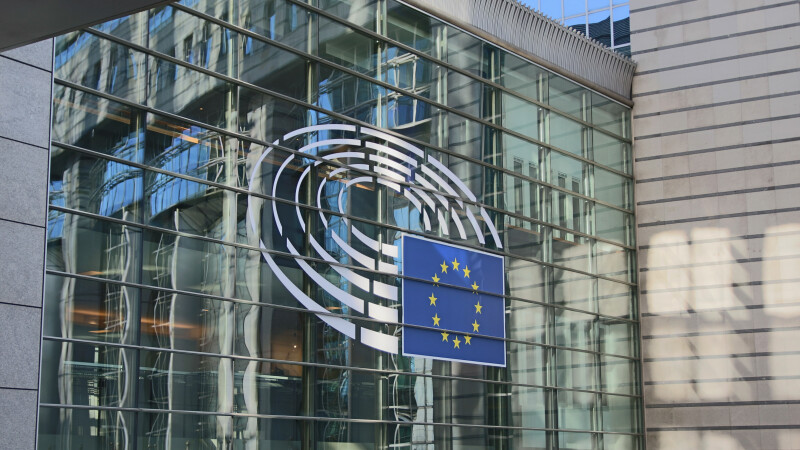
EU Declaration of Digital Rights: Member States, the European Parliament and the Commission have reached a consensus on the Declaration of Digital Rights and Principles. Although it is intended to serve as a reference point for Europe's digital transformation, it instead dives into murky waters, causing ambiguity. Its wording is unclear and it overlooks existing good proposals. The EU Parliament's proposal had a clear reference to Free Software as a way to ensure transparency in the use of algorithms and artificial intelligence, as well as the importance of Open Standards. Unfortunately, this wording was not retained during the inter-institutional negotiations, and the final text ended up being rather unclear.
The FSFE has also been working on the protection of open standards. While Alexander Sander participated as a panellist in the Open Standards and Industrial Use of Open Source workshop, part of the SWForum, a few months ago we responded to the EC Intellectual Property Consultation on a new framework for standard-essential patents.
Furthermore, the FSFE’s co-founder and programmer Bernhard E. Reiter explained why Free Software supporters should join the protest against the EU Chat control, that deprives citizens of the privacy of digital correspondence. And related to AI, this year our volunteer Vincent Lequertier published several interesting articles on ethics, Free Software, and AI in Planet FSFE.
Legal Support: helping projects and individuals
At the Free Software Foundation Europe we help answer licensing questions, provide technical support to make licensing easier (among others, with REUSE), provide legal education materials on Free Software, such as the videos from the Legal Education Day, and organise an annual conference for the FSFE's legal network, the Free Software Legal and Licensing Workshop (LLW). We are also part of several EU-funded projects, helping with legal concepts and issues.
REUSE: making licensing easier
The FSFE's REUSE project aims to make licensing easy for people and machines alike. It solves one of the most common Free Software licensing problems: what kind of licence a file is licensed under, and who owns the copyright. REUSE provides simple recommendations in three steps to help users, developers, and legal professionals.
Reuse 3.0: In 2023 we release the REUSE Specification 3.0. This specification defines a standardized method for declaring copyright and licensing for software projects. The goal of the specification is to have unambiguous, human- and machine-readable copyright and licensing information for each individual file in a project. Ideally this information is embedded into every file, so that the information is preserved when the file is copied and reused by third parties.
Several projects have adopted REUSE, being GNU Health one of them. Since then, users and re-users of GNU Health have been able to have a clear overview of the copyright notices and licence terms thanks to the standardised way of displaying them by following the REUSE specification.
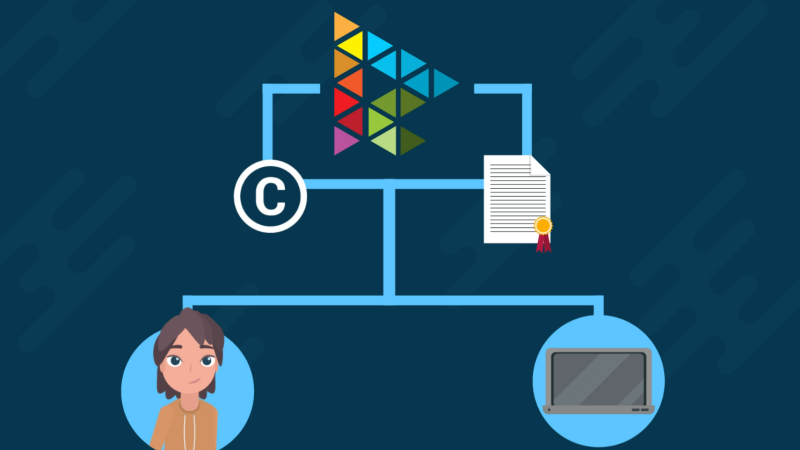
At the end of 2022, and during this present year, we have presented the REUSE initiative at diverse conferences throughout Europe, such as SFSCON or FOSDEM. Our talk at the Weizenbaum Conference 2022 “Practicing Sovereignty – Interventions for Open Digital Futures” resulted in an academic article (page 66-71) (pdf) explaining how REUSE specifications facilitate and improve management policies for the digital commons by improving data and metadata communication for individuals, communities, governments, and businesses.
Legal Education Day 2022
The FSFE organised a Legal Education Day as part of the South Tyrol Free Software Conference (SFSCON), which featured talks on legal topics relating to Free Software, as well as a workshop to facilitate a better understanding of these legal framework and compliances. Throughout the day, we explained basic legal concepts such as copyright law, licensing, and their practical applications into Free Software projects with the REUSE specification.
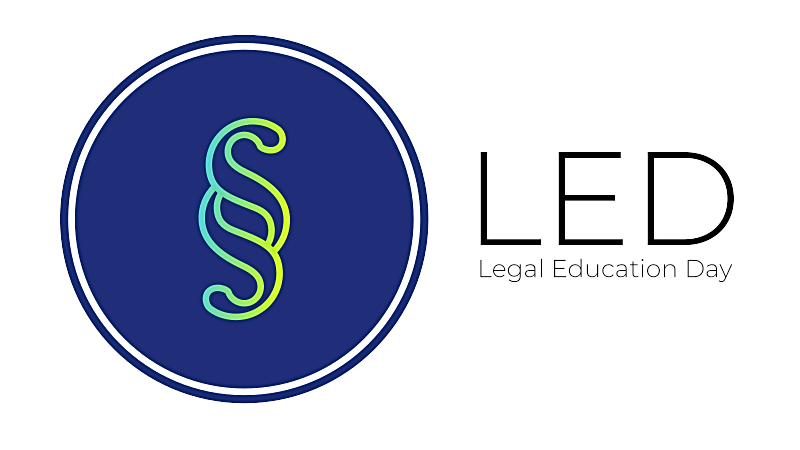
As part of the conference, our talks at the Legal Education Day were also filmed, and we have added these videos to our legal FAQs page, where you can watch them at your own pace or include them in other places.
Legal support, research, innovation and standardization: participation in EU projects
The ZOOOM Project: Since late 2022, the FSFE has been a part of the ZOOOM Initiative, a project financed by the European Commission. The primary goal of ZOOOM is to raise awareness among the academic, business, industry, and innovation communities of the importance of rights and obligations related to Free Software, Open Data, and Open Hardware.
To accomplish this goal, the ZOOOM Initiative will develop a series of reports, white papers, training materials, and web portals to promote a solid understanding of licensing requirements and business needs aiming to reach the three key groups of actors in innovation ecosystems: namely knowledge generators, innovation support organisations, and key stakeholders.
As one out of ten organisations comprising the consortium that makes up the ZOOOM Initiative, the FSFE is responsible for the promotion of our REUSE specification as well as producing educational materials on the fundamental legal concepts of Free Software and licensing.
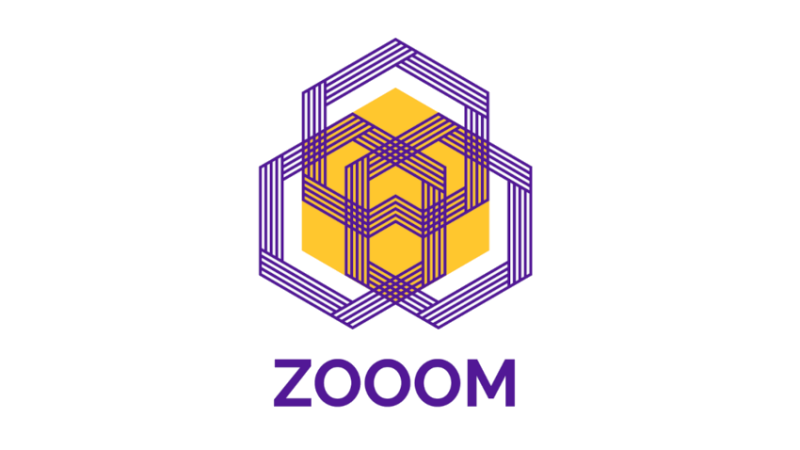
Our work on ZOOOM has been progressing well, and we have contributed with chapters to the various papers explaining the basics of Free Software, including elementary Free Software legal and licensing issues. In particular, we have also compiled a chapter on Free Software licensing issues related specifically to Artificial Intelligence (AI).
We will keep you updated on when we will publicly share these materials as we are currently awaiting their final publication, so stay tuned!
Next Generation Internet Zero: Since 2018, the FSFE has been involved in the Next Generation Internet Zero (NGI0) initiative as a consortium member. Funded by the European Commission, the NGI0 initiative hopes to support the development of the internet into a platform that is accessible and diverse, and that respects fundamental rights, including values such as privacy, which is also referred to as the Next Generation Internet. At the FSFE, we believe that Free Software is key to accomplish this goal, so that all users are able to use the internet as an effective tool to achieve their full potential.
NGI0 projects provide financial grants and technical support to researchers and developers who are working on Free Software solutions that contribute to the establishment of the vision of the Next Generation Internet.
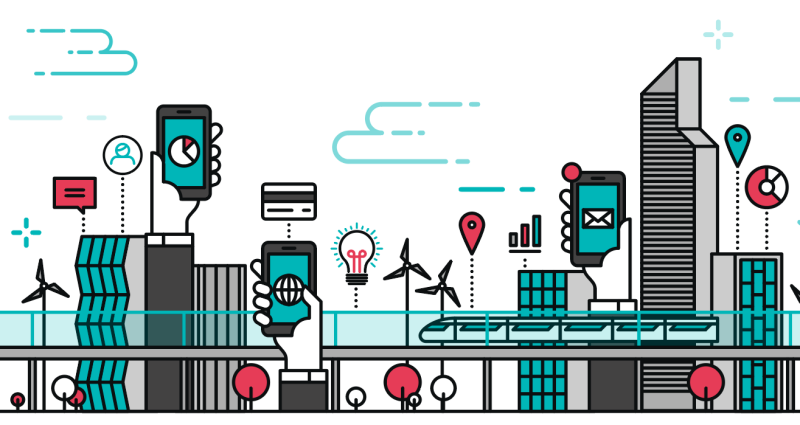
After completing our previous NGI0 projects in 2022, we have for the past year been working on our current NGI0 projects: NGI0 Entrust, NGI0 Core, and NGI0 Review.
As we’ve always done with our previous NGI0 projects, we have been assisting the software projects receiving grants from these various NGI0 projects with their legal and licensing needs, as well as helping them in their transitions when adopting our REUSE specification.
We continued our work with NGI0 this year by helping many developers working on Free Software solutions solve a diverse range of problems, as well as helping them have a better understanding of Free Software licenses, compliance issues, and how they can avoid some of these pitfalls by adopting our REUSE specification.
Legal Network and LLW 23
In 2023, the FSFE successfully organised our first Free Software Legal and Licensing Workshop (LLW) as an in-person event again, after a 3-year hiatus due to the COVID-19 pandemic.
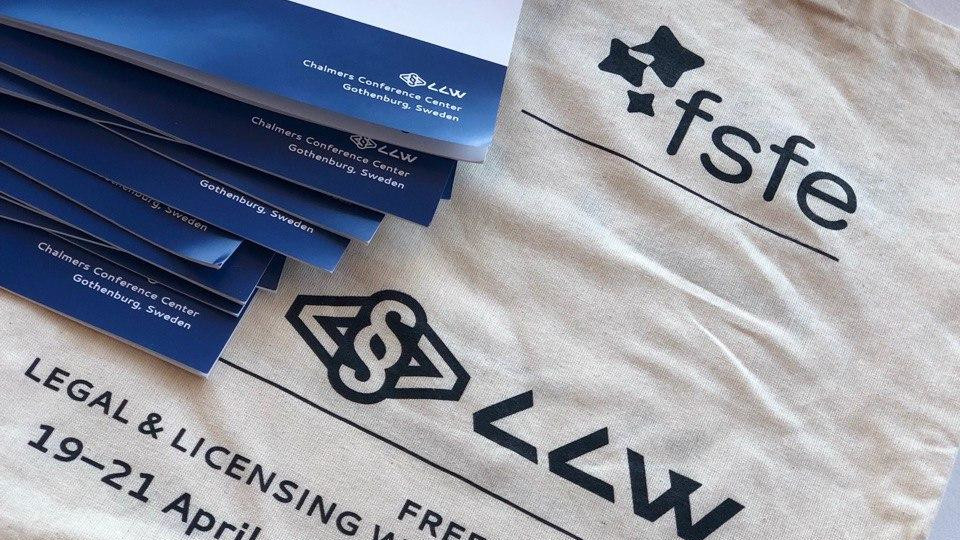
The LLW is organised every year by the FSFE to allow legal experts in the FSFE’s Legal Network to discuss legal issues and best practices surrounding Free Software licenses. This event has become one of the foremost gathering of lawyers, technologists, and thought leaders on Free Software legal and licensing topics. This event is usually an important opportunity that the FSFE provides to the legal community to share knowledge and updates on the topics that they are working on, in order to foster a better license compliance ecosystem by spreading best practices in the legal sphere. Additionally, the LLW provides a forum for legal professionals to better understand one another, which reduces overall friction in the sector. This year’s LLW was held in April in Gothenburg, Sweden. Over the course of three days, our 100 guests discussed software licensing issues relating to AI, process issues in license curation at the Open Source Initiative (OSI), and updates on legal cases involving Free Software licenses.
The last weeks of 2022 also left us some good news! Copyleft-licensed chess engine won legal case against proprietary counterpart.
TEDective: making European public procurement data explorable
TEDective is making European public procurement data explorable for non-experts. Using open data this Free Software program empowers citizens by making EU tendering data accessible to anyone who wants to consult and use it. For example, it will allow a journalist to find out how much money the government spends on Microsoft licenses and products, but also to compare that spending with other regions in similar cases or even in comparison with other countries.
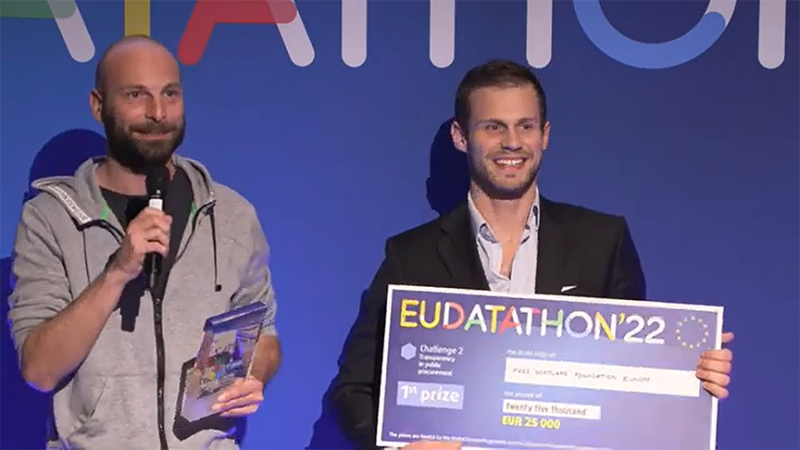
‘TEDective’ won last year the first prize in ‘transparency in public procurement’ challenge in the EU Datathon.
Developed with the help of our volunteer Michael Weimann, and released as a REUSE-compliant project under a Free Software (also known as Open Source) license, TEDective improves access to the data published by Tenders Electronic Daily (TED), by fulfilling all of the following requirements for the provision of TED data: it is available free of charge for both commercial and non-commercial use; it is up-to-date (updated at least monthly), cleaned and both buyers and suppliers are adequately deduplicated; and it can be downloaded in bulk, making it available as an Open Contracting Data Standard (OCDS) to enable interoperability. Besides, it will be designed, developed, maintained and monitored transparently and in close collaboration with all relevant stakeholders and user groups.
Over the next few months, we will be working to develop this tool further and we are looking for contributors who would like to get involved or fund the project. Get in touch via tedective@fsfe.org if you are interested!
Device Neutrality: taking control of devices
We started the Device Neutrality initiative to raise awareness about the increasing loss of end-user control over technology. In our increasingly technology-dependent societies, Device Neutrality aims to put control back in the hands of end users, allowing them to bypass gatekeepers and use Free Software on their devices in a non-discriminatory way.
2022 ended with the important step of the adoption of the Digital Markets Act by the European Parliament. This legislation introduces the principle of Device Neutrality, although it does not set open standards as the default for defining interoperability.
In 2023 we have continued our efforts to bring Device Neutrality into the European legislation. We have also deepened this concept with in a podcast episode and worked on the creation of a dedicated landing page on this topic, which will be online soon, and of course, we have continued to try to achieve Router Freedom in Europe and with our Upcycling Android campaign.
Router Freedom: a EU demand
Router Freedom is the right of customers of an Internet Service Provider (ISP) to choose and use a private router instead of a router that the ISP forces them to use. But some Internet service providers in Europe dishonour this principle by dictating which device their customers have to use in order to connect to the Internet, or by discriminating against the owners of alternative devices. This undermining of our basic freedom of choice is strongly opposed by the Free Software Foundation Europe and many other organisations, projects, and individuals. Router Freedom is not merely a topic for experts. It affects us all.
- EU Survey: More than a thousand consumers from across Europe have shared their experiences of ISPs' commercial practices in our pan- European survey regarding freedom of terminal equipment, resulting in a call for Router Freedom.
- Router Freedom as priority for the future of Net Neutrality regulation: The EU Commission has published a study on the future of Net Neutrality regulation, confirming Router Freedom as a priority for the future implementation of Open Internet in Europe. (Recommendation 2, p. 91). The study refers to the FSFE's work (p.11) and supports the conclusions we at the FSFE have been advocating for the last few years. In particular, national regulators should prioritise end-user rights and ensure terminal freedom for all network types, including fibre (FTTH).
- Our staff and volunteers have been working to bring Router Freedom to the national level. Thanks to their efforts, Belgium is working to ensure Router Freedom and Greece is also ensuring Router Freedom although it excludes fibre connections. However there is still a long way to go as in Germany, for example, telcos want to exclude fibre from Router Freedom, which goes against the German law and the EU regulatory framework of net neutrality.
Upcyling Android: free your device and “become greener”
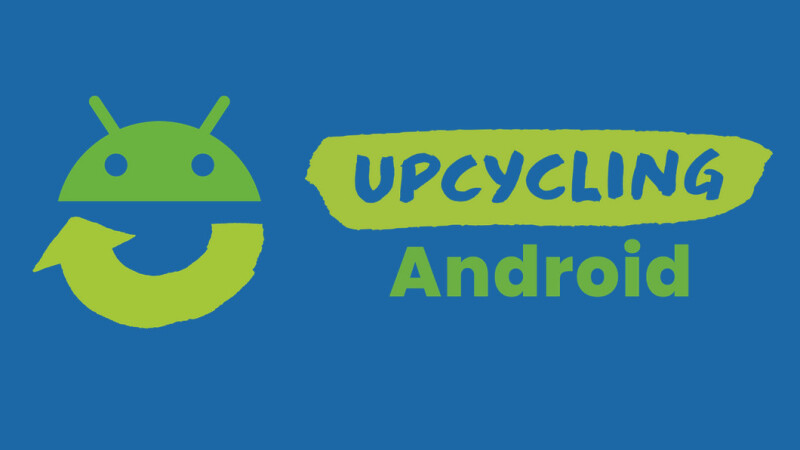
“Upcycling Android" is the name of an initiative that the FSFE has been running for the last few years and that was officially ended in March 2023. Launched in November 2021, Upcycling Android initiative helps people to flash their phones with Free Software operating systems and promotes the right for every user to install any software on any device. Moreover, upcycling our devices is an important step to rethinking our short-term, linear consumption of electronic devices in favour of a circular economy.
The initiative held workshops, developed policy recommendations, and received a lot of attention:
-
Workshops: A total of 12 workshops were organised by the FSFE, consisting of a short introduction, a joint flashing of phones with a question and answer session, followed by individual flashing of phones, and ending with tips and tricks for further using Free Software on mobile phones with F-Droid and microG.
Some of the workshops were held at international conferences (Bolzano), others in public spaces and libraries (Bonn, Berlin), in a university environment (HAW Hamburg), in a local hackerspace (Frankfurt, Berlin) or a repair café (Korschenbroich-Herrenshoff), and even at the Federal Environment Agency.
An online “Train the Trainers” workshop was also held to teach people about how to organise their own workshops.
Information and background material: Throughout the campaign, the FSFE has created various resources (posters, infographics, stickers, flyers, brochures, video...), published under Creative Commons licences and in digital form on the initiative's website. Thus, even after the project has ended, this material can be freely used by others who want to continue promoting the use of Free Software, while overcoming software obsolescence and extending the life of our hardware.
In addition, technical documentation, including videos showing how to flash different terminals, has been created to enable the workshops offered to be reproduced independently during and after the end of the project.
-
Open Letter: to European Union legislators on "The universal right to install any software on any device". As part of this initiative, this Open Letter sets out four key demands to enable a more sustainable use of electronic products and devices in the European Union. It has already been signed by more than 150 civil society organisations, many of them not previously involved in Free Software, from different sectors, as well as more than 3000 individuals. In particular, the signatory organisations ensure further virality of the campaign within their own target groups.
-
Outreach: Throughout the initiative, outreach was done through press releases, news articles, social media posts using the hashtag #UpcyclingAndroid, podcasts and various presentations at various international conferences. The materials we produced helped us reach different audiences, and our volunteers and civil society organisations also picked up on our messages. Thank you for spreading the word.
The book ‘Shaping Digital Transformation for a sustainable society’, published this year, is a collection of 28 papers from the second Bits & Trees conference on digitalisation and sustainability. In a chapter entitled 'Making the telecom sector more sustainable with Free Software', Lucas Lasota and Erik Albers explain how Free Software is key to a more sustainable telecom sector by giving end-users more control over devices, especially with regard to artificial obsolescence of software and hardware.
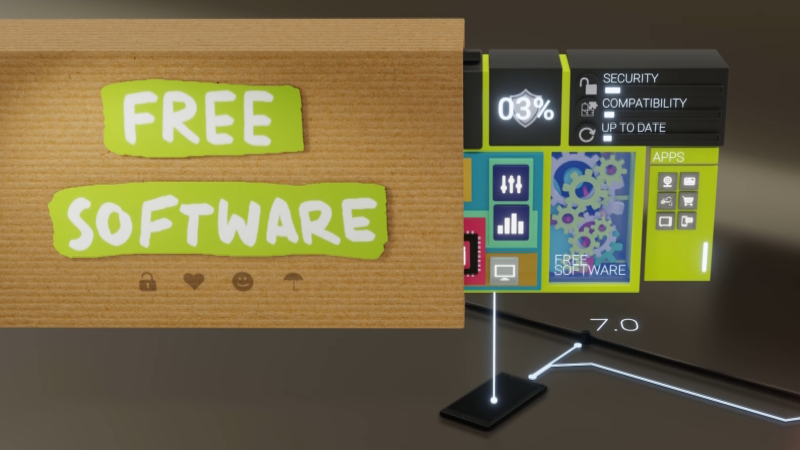
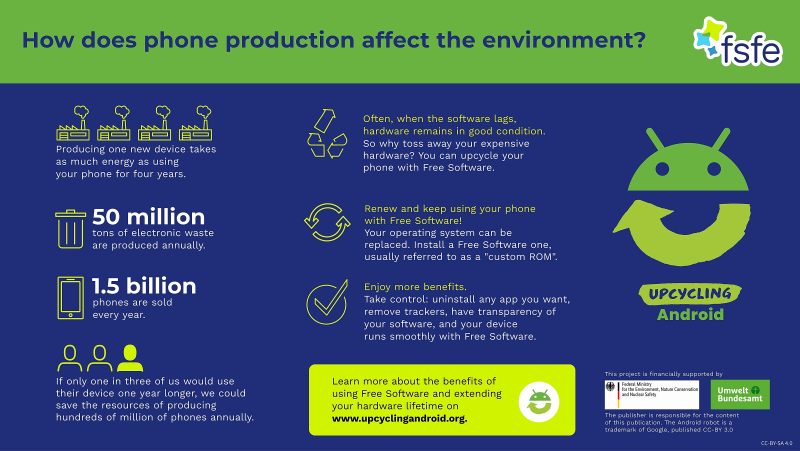
This initiative has officially ended, but there is still work to be done. You can continue to demonstrate the benefits of unlocking your devices by organising a workshop, signing the Open Letter... All the documentation, information and materials are there. And remember, rooting your device does not void its warranty.
Our work on public awareness
I Love Free Software Day: Meet & Connect
Once again, the FSFE has celebrated our devotion to Free Software on the annual "I Love Free Software Day" on 14 February 2023.
This year, we celebrated it with Free Software enthusiasts through various events across Europe (Berlin, Madrid, Thessaloniki, Potteries, Zurich, Frankfurt, Barcelona, online in Italy). For the first time, the FSFE's women's group participated by organising a meeting. Besides the FSFE, many other organisations and individuals joined us to publicly show their love for Free Software and their appreciation for all the wonderful contributors without whom Free Software would not be possible. ❤️ Thank you!
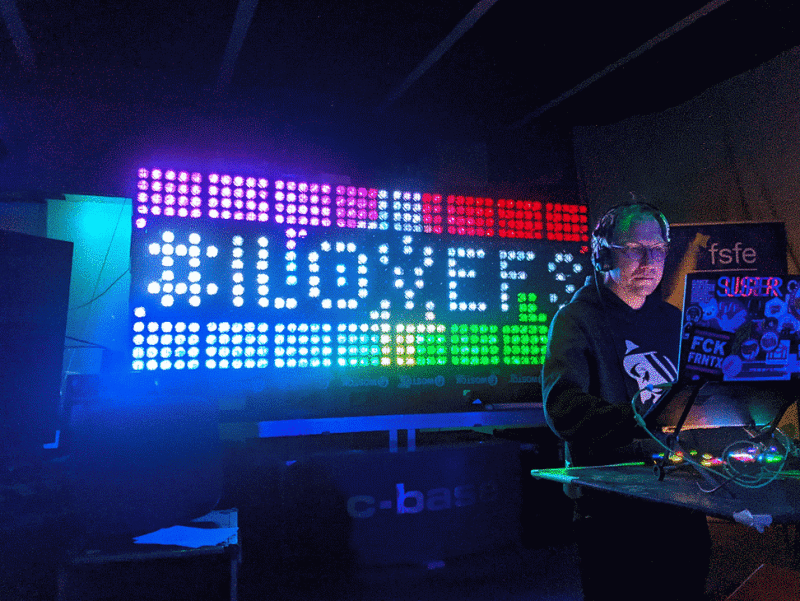
Apart from all the events and activities on the day itself, we also have new postcards and stickers. Many Free Software projects have received a hand-written thank-you postcard, thanking them for their continued and wonderful work for software freedom.
And we are already working on next years’ celebration so save the date: 'I Love Free Software Day 2024: start software freedom' will take place on 14 February 2024.
Software Freedom Podcast
The FSFE’s Software Freedom Podcast has continued throughout the year, with 6 new episodes.
This year, the podcast covered topics such as European politics, Device Neutrality, the importance of Free Software in medical devices, cryptography and privacy and Free Software in France.
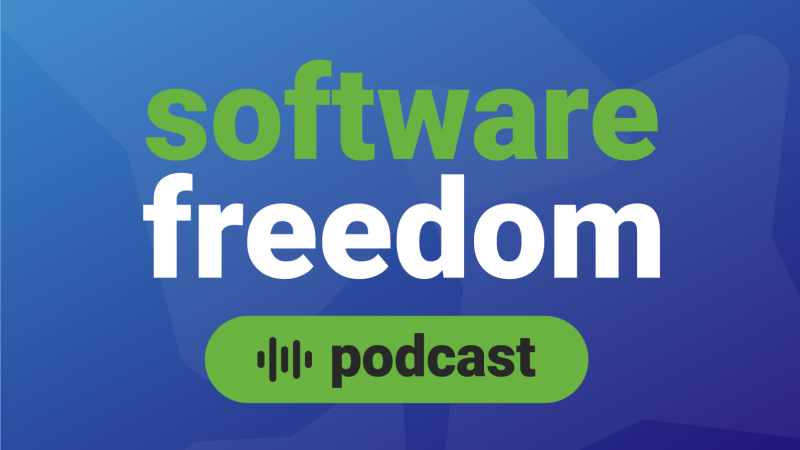 Listen to all the Software Freedom Podcast episodes
Listen to all the Software Freedom Podcast episodes
Free Software and Federated social networks
The FSFE is active on Peertube and Mastodon. We created our own Peertube instance, media.fsfe.org, to share our videos on a Free Software platform and we currently have about 776 subscribers. Remember to subscribe if you want to be informed about our latest videos.
Our presence on Mastodon has also grown, and we currently have more than 12,700 followers! It is also great to see how more and more people and organisations are joining these and other decentralised social networks.
FediGov: The FSFE Swiss local group launched, with GNU/Linux.ch, an initiative to encourage public institutions to use federated Free Software solutions to communicate with their people. FediGov is the name of this campaign, which also encourages people to ask their governments to adopt ethical communication.
Fediverse Education Day: The FSFE, the Centre for Civic Education of the State of North Rhine-Westphalia and the Adult Education Centre Cologne organised a public symposium on the Fediverse, its functionalities, its potentials and ways to use it for public institutions and administrations. More than 70 guests attended the event and we will publish the videos of the presentations soon.
‘What is Free Software’ Video
We continued to spread the word with our 'What is Free Software' video. The video was released last year so we focused on spreading the word about it and translating it into more languages. Thanks to our translators and a fundraising campaign, we now have the video currently in several European languages: Danish, Dutch, English, French, German, Greek, Italian, Polish, Portuguese, Spanish and Swedish:
Watch and share our 'What is Free Software' video. In our playlist our Peertube channel you can find it in all the translated languages:Back to the stages, the booths, and “the hugs”!
The last few months of 2022 have brought us back to the stage after years of online conferences. We couldn't be happier to see old friends and meet new ones in person. Our team took part in a wide variety of conferences, giving talks and running stands.
Our “season” started with SFSCON in Bolzano, where we enjoyed not only a fruitful conference with our second Legal Education Day, the first Italian community meeting, and many interesting talks, but also some fun and networking time, such as our well-known Pizza Evening.
At the beginning of February, we travelled to Brussels for FOSDEM! We were really pleased to see so many of you there! Our booth was really busy with people wanting to know a bit more about us, participants who heard our colleagues talked and wanted more information, and lots of old friends just stopping by to say hello. Check out our talks at FOSDEM 2023 and the videos from the Legal & Policy Devroom, which we co-hosted together with Software Freedom Conservancy.
The spring found us attending foss-north, where we co-organised a track on political, social, and legal issues around Free Software
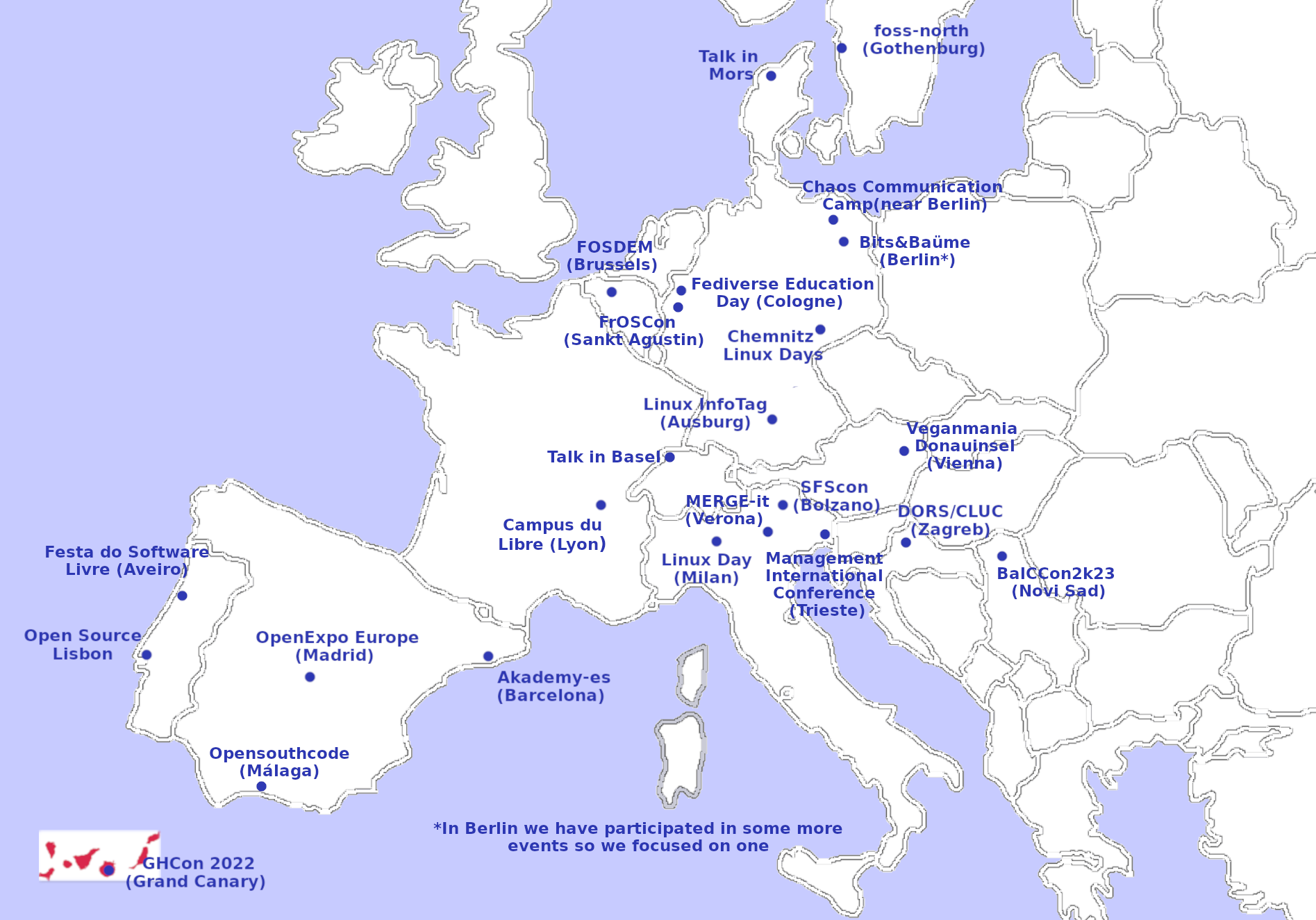 Map showing the different events that we have around Europe
Map showing the different events that we have around Europe
None of these events would have been possible without the help of our community! The backbone of the Free Software Foundation Europe's work is its active network of Free Software advocates and volunteers who help promote and spread the benefits of Free Software across Europe. Their contribution and dedication allows us to continue our campaigns, lend a hand to our team during our events, and help set up a booth.
Our local groups have been meeting throughout these months: some have returned to face-to-face meetings, others have continued with online meetings, and others are mixing it up, and we even have new communication channels... Each option is good to engage in fruitful discussions, to deepen some concepts and ideas, to meet others with the same interests and even to get active in developing new activities.
Our team of translators has done an extraordinary job. In the last twelve months, we have added 340 new translations to our website! And we have around 318 new pages in English!
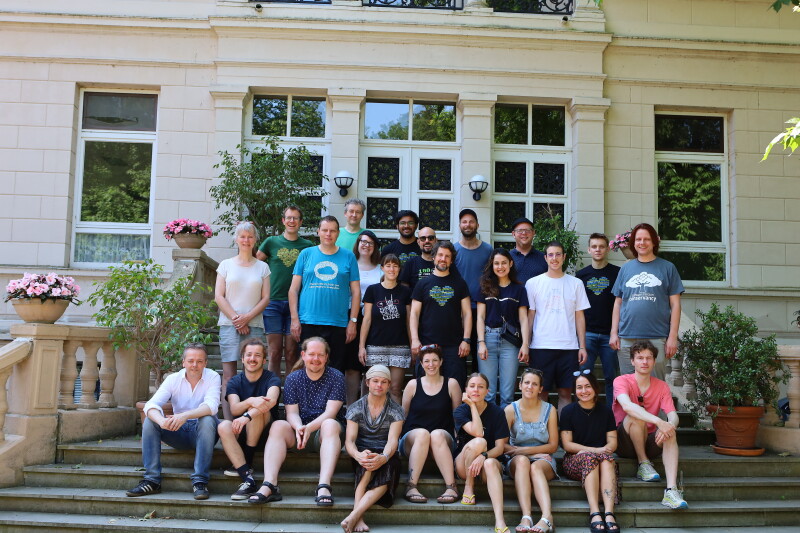
This year we also started online coordinators' meetings. The aim of these meetings is to discuss different topics with our coordinators and to learn from each other's experiences. The meetings are also a tool to network with coordinators from other countries.
But this year we also wanted to spend time with our volunteers in a more relaxed environment and thank you in person for all your contributions. The Linux Hotel hosted us for a summer meeting weekend where we shared information about our current activities and campaigns, learned from the experience and knowledge of our volunteers, and had a really good time!
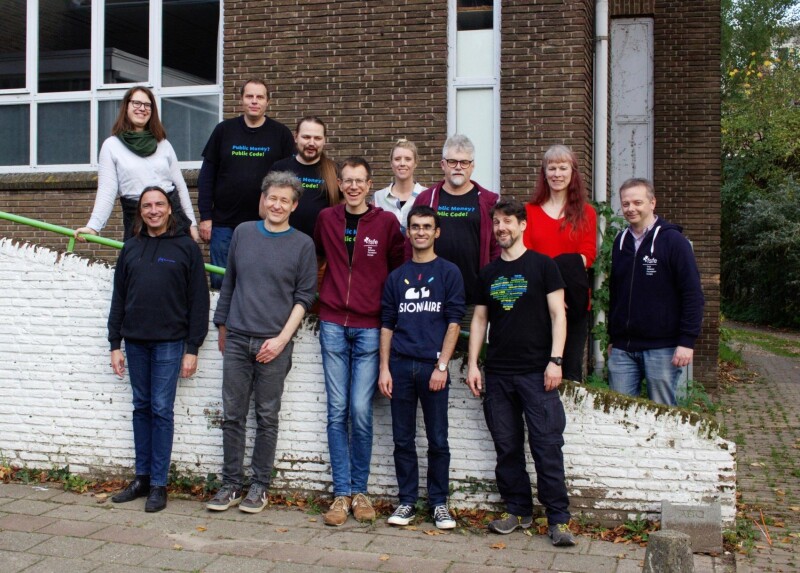 As an e.V. association, the General Assembly of the
FSFE met for its annual meeting at the end of last October.
As an e.V. association, the General Assembly of the
FSFE met for its annual meeting at the end of last October.
Join the movement
Become a supporter: Your support and contribution for the promotion of Free Software are important for securing our continuous work, ensuring our independence, strengthening our democratic society, promoting and implementing concrete steps towards software freedom, and making it easier to use and develop Free Software.
Advocating for freedom costs money and we depend on people like you to support us. We guarantee that all support is used to foster software freedom in Europe a little more each day, step by step, bit by bit for the next decades.
With your help we can keep on defending software freedom. Thank you for your trust, your support, and your ideas to continue bringing Free Software to our society!
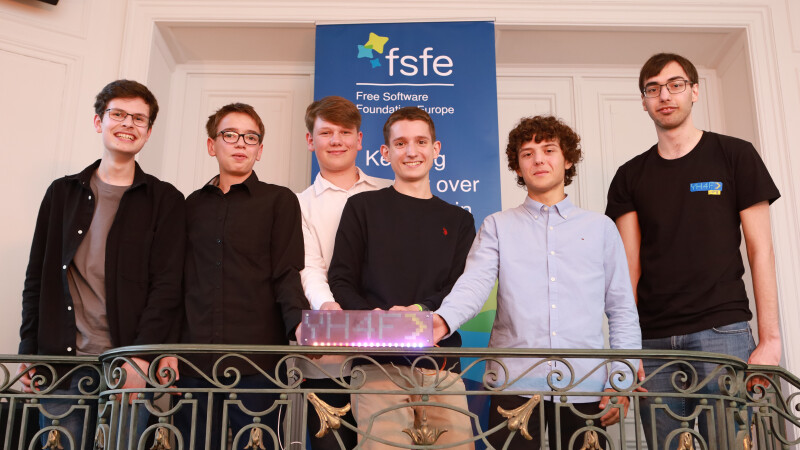
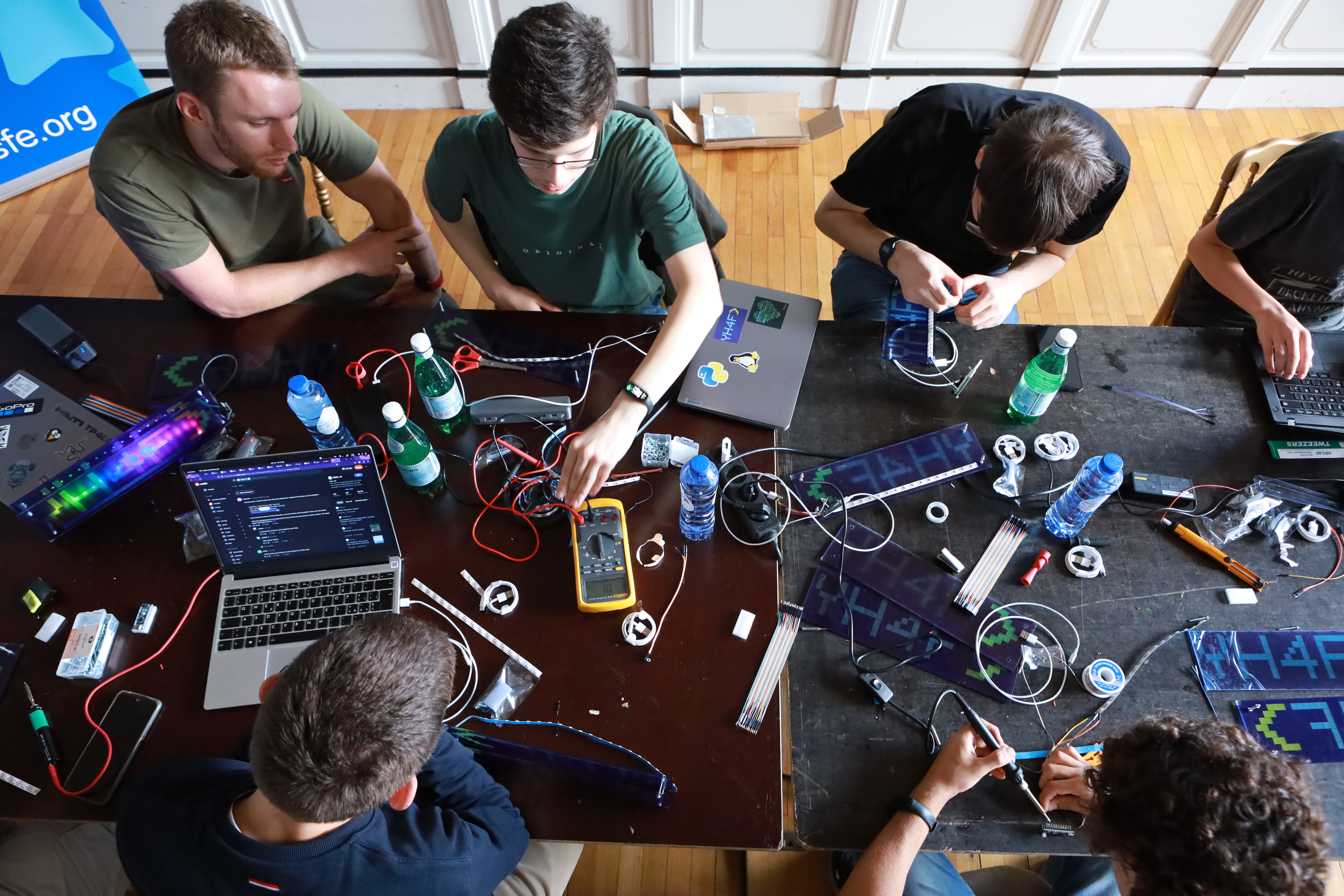
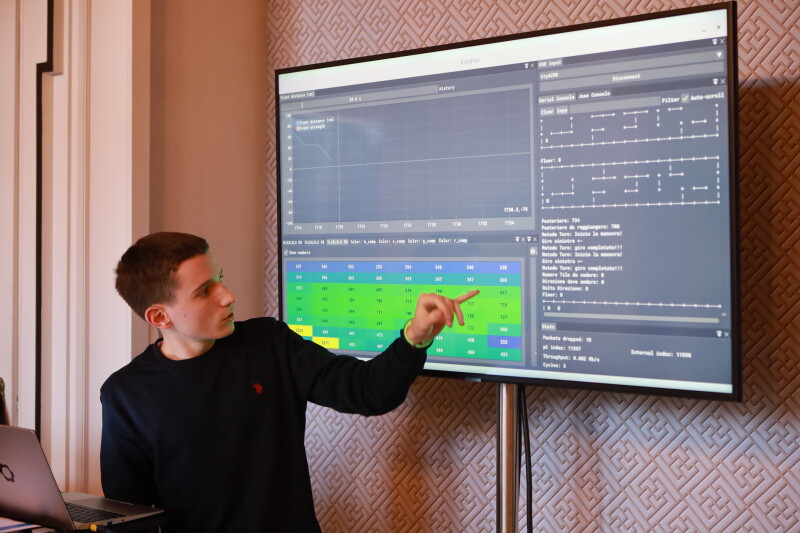
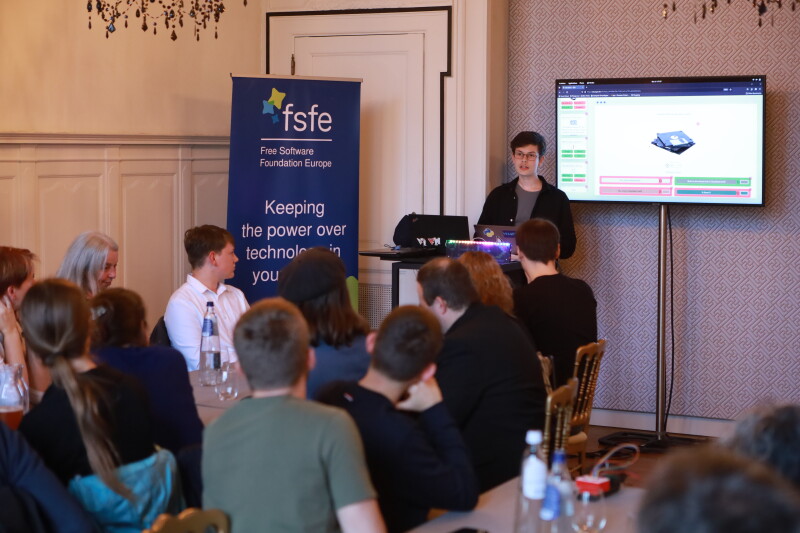
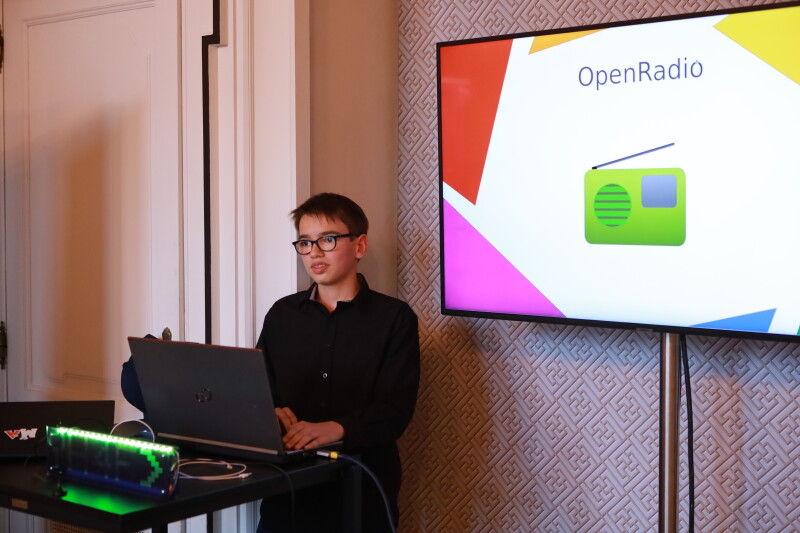
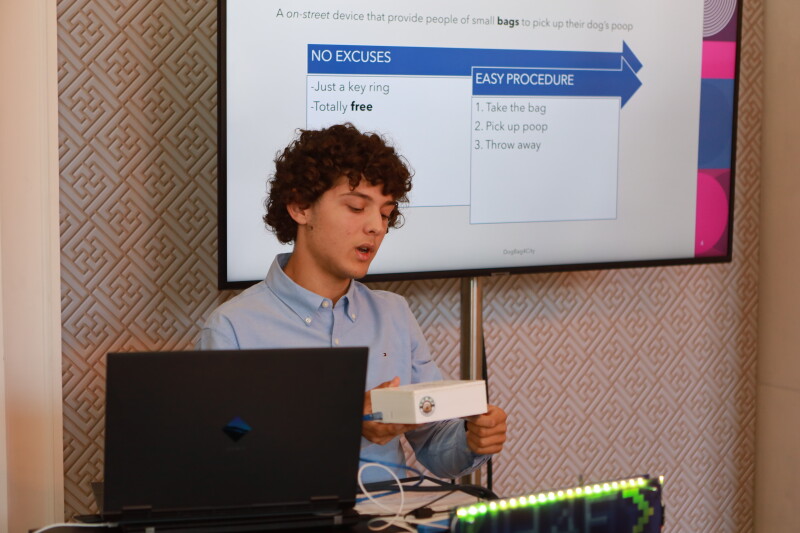
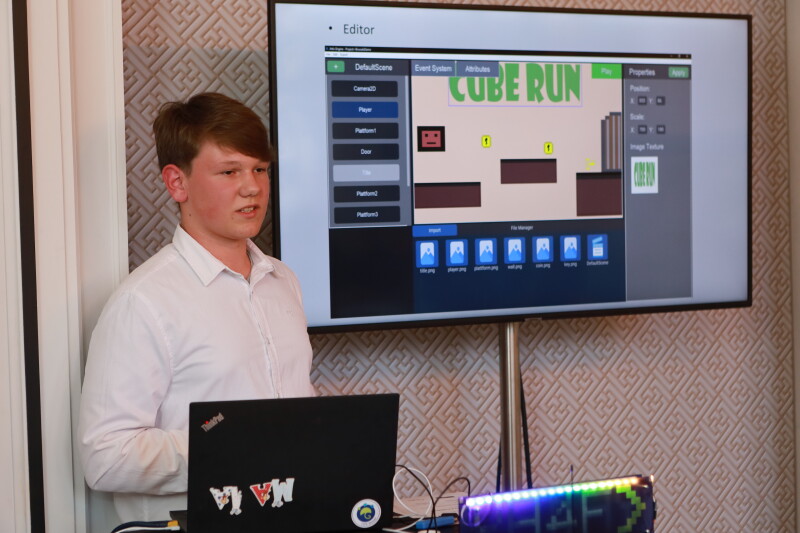
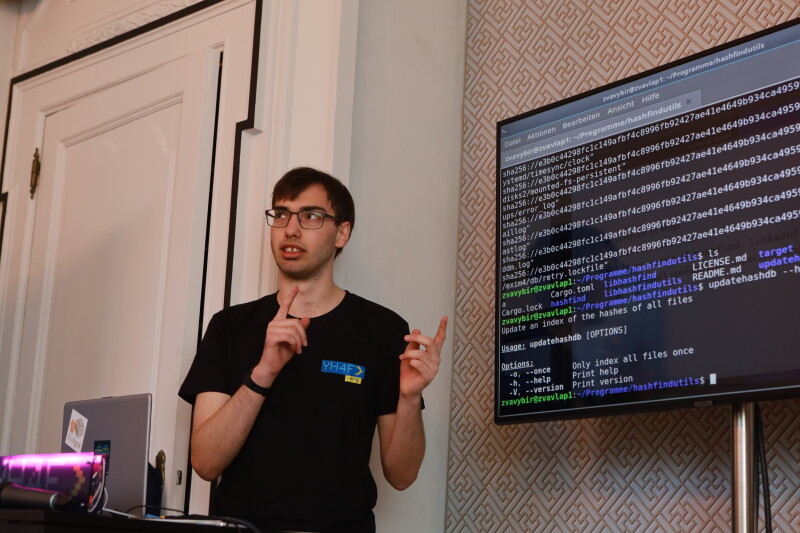
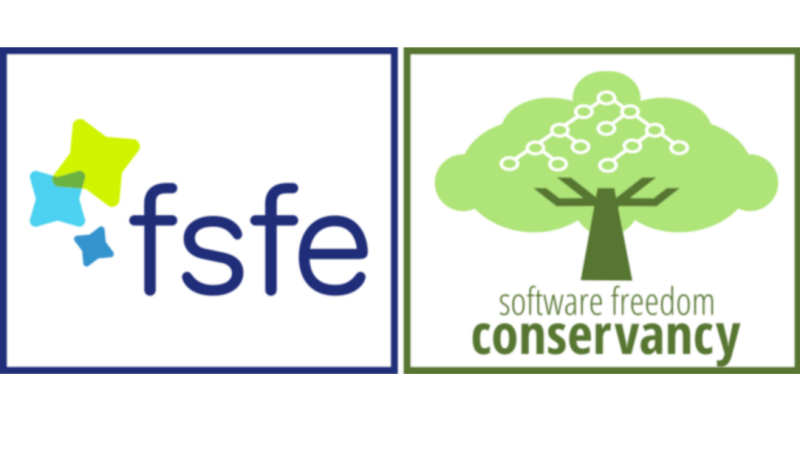
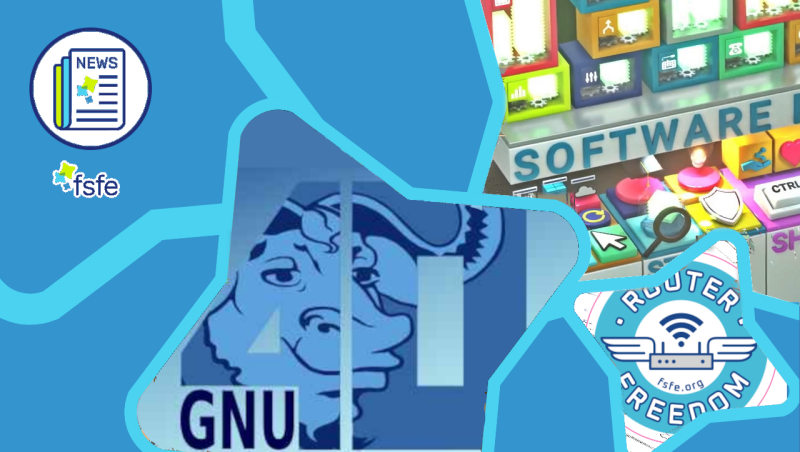
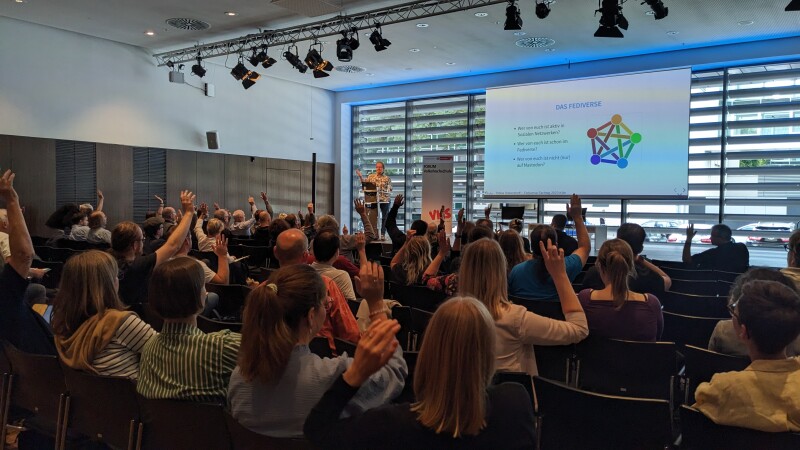
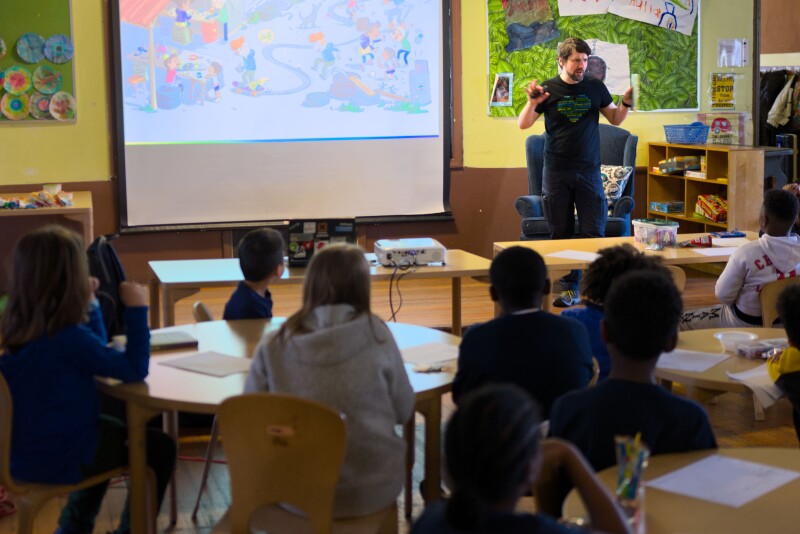
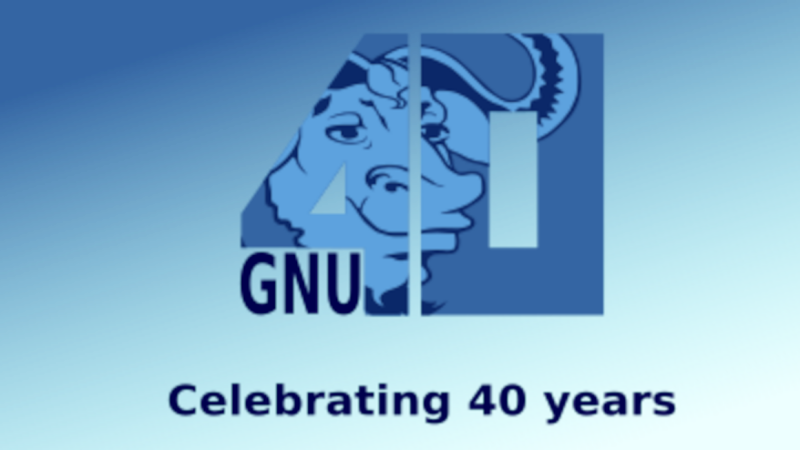 Did you know that the most powerful supercomputers run with Free Software?
Did you know that the most powerful supercomputers run with Free Software?